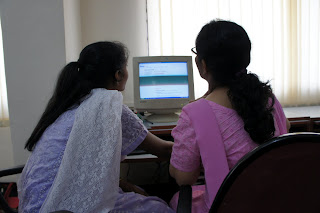Higher Education Issues
Educators are forever inundated with change. As we often hear, "change is constant." Change is part and parcel of today's life, thus the importance of change management, paradigm shift, managing change because being able to change is changing for the better and so on.
Education today is also no longer what we knew it as. Fundamentally, it is the same. It is about learning and learning is about content, interaction and assessment. However, content may no longer need to come from the teacher alone. The teacher, has truly, I think needs to become more and more a facilitator of learning, more so today than before.
I remember the first time I heard the word facilitator (in the context of learning) was in 1985 when I was about to leave for the US for my university studies. I was to become a "facilitator" at the end of my studies in MRSM or Maktab Rendah Sains Mara (Mara junior science colleges - secondary schools with an emphasis on producing brilliant science students) and it was important to distinguish what a facilitator does and does not do compared to the "teacher."
Come to think of it, being a facilitator seems the easier of the two, but in reality, it is not. Having played out the role of being facilitators of several courses and over many years now, the outcome is different. I believe facilitators will produce learning at the end (of course in varying degrees) but together with it is the opportunity for learners to excel and exceed normal expectations. A teacher on the other hand, stays tightly with the syllabus and will hesitate or not allow learners to go beyond what is expected. Of course, you may disagree. But, that's my take on this.
Coming back to issues in higher education. It seems that Learning 2.0 is the in-thing among learning enthusiasts. Those who are not quite into technology will cringe and help in whatever way to resist the flow and stay put wherever they are in their own comfort zone. The reality is, it is possible that the way we see the Ivy Leagues going into the future, such educators will become the dinosaurs in education and hinder the progress of the development of human capital.
Imagine universities such as Berkely, Stanford, Yale and MIT offering lectures via podcasts for everyone else to download (visit http://www.academicearth.org/) and imagine the world of education becoming more and more open and widely available to every netizen. It will be just a matter of time before we see credit transfers taking place more widely and more significantly in more ways than one. Imagine a credit bank system where students can accumulate enough credits from various universities around the world graduating with a degree from a consortium of universities responsible for his education. Possible?
Meanwhile, read about current issues for/in/on higher education in Tomorrow's Professor at http://amps-tools.mit.edu/tomprofblog/
Education today is also no longer what we knew it as. Fundamentally, it is the same. It is about learning and learning is about content, interaction and assessment. However, content may no longer need to come from the teacher alone. The teacher, has truly, I think needs to become more and more a facilitator of learning, more so today than before.
I remember the first time I heard the word facilitator (in the context of learning) was in 1985 when I was about to leave for the US for my university studies. I was to become a "facilitator" at the end of my studies in MRSM or Maktab Rendah Sains Mara (Mara junior science colleges - secondary schools with an emphasis on producing brilliant science students) and it was important to distinguish what a facilitator does and does not do compared to the "teacher."
Come to think of it, being a facilitator seems the easier of the two, but in reality, it is not. Having played out the role of being facilitators of several courses and over many years now, the outcome is different. I believe facilitators will produce learning at the end (of course in varying degrees) but together with it is the opportunity for learners to excel and exceed normal expectations. A teacher on the other hand, stays tightly with the syllabus and will hesitate or not allow learners to go beyond what is expected. Of course, you may disagree. But, that's my take on this.
Coming back to issues in higher education. It seems that Learning 2.0 is the in-thing among learning enthusiasts. Those who are not quite into technology will cringe and help in whatever way to resist the flow and stay put wherever they are in their own comfort zone. The reality is, it is possible that the way we see the Ivy Leagues going into the future, such educators will become the dinosaurs in education and hinder the progress of the development of human capital.
Imagine universities such as Berkely, Stanford, Yale and MIT offering lectures via podcasts for everyone else to download (visit http://www.academicearth.org/) and imagine the world of education becoming more and more open and widely available to every netizen. It will be just a matter of time before we see credit transfers taking place more widely and more significantly in more ways than one. Imagine a credit bank system where students can accumulate enough credits from various universities around the world graduating with a degree from a consortium of universities responsible for his education. Possible?
Meanwhile, read about current issues for/in/on higher education in Tomorrow's Professor at http://amps-tools.mit.edu/tomprofblog/

Comments